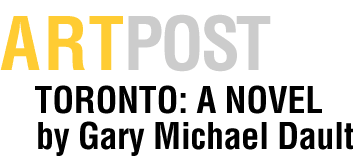TORONTO: A NOVEL—Chapter 41
Poet Rory Pendrift woke up feeling undervalued.
At first he wasn’t even sure where he was, and then, gradually, as his eyes entered into alignment with the soft morning light slanting into his third-floor room through the little, porthole-like window in the east wall, he saw himself once again in the context he had contrived for himself—the poor young writer in his garret, the Thomas Chatterton of the 21st century—alone, unloved, unheralded, uncompromised.
As yet uncompromised. Rory’s father, condo developer, Pierpont Pendrift, had only recently begun to lessen his attacks on his son’s rudderless way of life, and, until a few mere weeks ago, had threatened his poetaster offspring with a small but promising niche in the family firm. It was his father who had suggested—only a week ago Tuesday—that if Rory fancied himself a writer, he could settle down to write a few seductive brochures for the firm’s next condo-complex, a megalithic mini-city of four adjoining residential towers sitting atop a vast table-like plateau of restaurants and stores.
“We’re going to be calling it Ivanhoe Towers,” his father had told him, sawing off a mighty shard of his prime rib and lashing it with horseradish.
“Why?” asked Rory.
“I think there too much easy modernism around these days, said his father, emptying his goblet of red wine and quickly refilling it. “I’m swinging the pendulum backwards,” he added. “Reifying the past!”
It’ll only be a Hollywood idea of the past,” Rory told him. “Ivanhoe” sounds more like the 1950s than the Middle Ages. Too bad you can’t get Robert Taylor to be your spokesman.”
His father roared with laughter.
“Robert Taylor! That was the name of the tiger in that novel, Life of Pi, right?”
Rory was dumbfounded.
“You’ve read Life of Pi?”
“Sure. What’s the matter, you don’t think your old man can read? I read all the time!”
Rory nodded, and took another forkful of his scallop risotto.
“I just wanted to point out that Robert Taylor is the name of the actor who played Ivanhoe in the Hollywood film,” said Rory quietly. “It predates the Yann Martel novel by quite a lot.”
“The what novel?”
“Yann Martell. The guy who wrote Life of Pi.”
“Ah,” said his father, draining his carafe of wine. “Listen, you want some dessert?”
“No thanks.”
“Well,” announced his father heartily, “I’m going to get me a big slab of New York Cherry Cheesecake. And an expresso.”
“Espresso,” said Rory quietly.
“What?”
“Espresso. Es-presso. Es, not ex.”
“Whatever you say, Mr, Poet,” said his father, beckoning to the waiter.
*********************************************
Michael lay on May’s bed and watched her getting dressed. He watched her walk over to the kitchen with a fresh pair of panties and a bra in her hand and, turning her back to him, skinny into the panties and then hook herself into the wispy flesh-coloured bra. Then she turned back across the room, sat on the edge of the bed beside Michael, and pulled herself into her black jeans.
“That looks nice,” Michael told her.
“What does?”
“You in your jeans and just your bra.”
May smiled.
“I’m going to fix that in just a second.”
“Oh don’t,” Michael implored her, with a mock urgency he hoped would amuse rather than offend her.
“Well, I can’t go to the bookstore like this!”
“I guess not, but you could come closer to me and lie in my arms and I could quietly take everything off again!”
May laughed.
“A girl doesn’t make much progress getting dressed with you around.”
“It depends on what you mean by progress,” said Michael, carefully reaching around and unhooking her bra again.
**********************************************
Violet Dollop had finally purchased a fountain pen—not the Mont Blanc or the Lamy she wanted, but a pen she felt was likely, at least, to be serviceable. It was a nice, rich, olive-green colour. It was like holding an olive-branch in your hand, she thought idly, wondering then whether an olive branch wasn’t too iconically peace-oriented for her purposes. A laurel leaf was what she needed. A whole wreath of them. A laurel wreath for the literary victor! Well, she thought to herself, my olive-coloured pen could pass, I dare say, for a laurel-coloured pen.
“I wonder why they don’t manufacture laurel-coloured pens,” she said to herself out loud.
She was seated at the kitchen table, her coil-bound notebook open before her. Tom had just left for the office and she was just now finishing the last of the coffee. She was thinking about how it might be nice to brew a second pot—and realized, halfway through the reverie—that it was just another way of avoiding getting down to work.
But what work?
Well, she had one or two ideas. One was that she would write an intense, up-close, shockingly, disturbingly intimate portrait of her own neighbourhood. She’d lift the lid off all that complacency, she thought. But then she rather liked and in some ways depended on that very complacency—which, while it was unadventurous, sometimes seemed like a salve on the wound of the rough and abrasive city that lay just beyond their suburb.
So maybe she ought to write about that very roughness and abrasiveness?
No. It simply wasn’t her.
But what was? Then it came to her. Tom was.
Tom would be her subject. She would anatomize her husband in prose. Pillory him in language. Pin him down in pushpin prose. Fix him with sharpened dartboard words. She could hardly wait for him to get home tonight. His bland calling out to her, his eternal ‘Violet, I’m home!’ would no longer irritate her. Not now. Now she had a writer’s immunity to it.
For now it was going to be the first sentence in her manuscript. “Hi dear, how was your day?”

